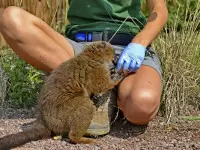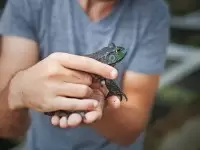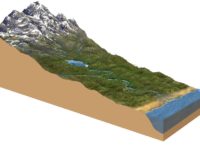
Entomology is the study of insects, including their relationships with other animals, their environments, and human beings. Entomological research can also give us broader insights into ecology, evolution, and social behavior.
Entomologists study insects, such as ants, bees, and beetles. They also study arthropods, a related group of species that includes spiders and scorpions. Most entomologists specialize in a particular type of insect.
Insects outnumber all other forms of life combined, and perform functions vital to life on earth. Consequently, entomologists make many important contributions to scientific knowledge, such as the best ways to pollinate crops, conserve insect species, and protect crops, trees, wildlife, and livestock from pests. Understanding the roles insects play in their environments can also help us restore disturbed ecosystems and clean up contaminated sites. Some entomologists study how climate change will affect insect species and their distributions.
What Does an Entomologist Do?
Entomologists study insects, their environments, and their behaviors through observational, experimental, chemical, and genetic techniques. They may specialize in a particular species or taxonomic group, or the use of insects for particular applications or industries.
Agricultural entomologists study how to protect crops from pests, without harming beneficial insect species like bees. They may develop new types of "integrated pest management" that uses some species to control others, reducing the need for pesticides.
Veterinary entomologists work on ways to protect livestock, wildlife, and zoo animals from insect pests and the diseases they carry.
Medical entomologists research ways to prevent the spread of diseases like West Nile Virus and Rocky Mountain Spotted Fever from insects to people.
Taxonomic entomologists work in the field looking for insects still unknown to science. Discovering new species helps us understand evolution and the role of insects, and can potentially lead to new medicines.
Forensic entomologists help solve murder cases by studying the insects associated with dead bodies. They can help determine the timeline and location of a crime.
Forest entomologists help protect wild plants and forests by studying the insect pests that attack them.
Structural entomologists study insects found in buildings, such as cockroaches. They research ways to prevent them from entering, and how to get rid of them once they've settled in.
Learn more about entomology, the study of insects.
Where Does an Entomologist Work?
Many entomologists are faculty members at colleges and universities. Doctoral degrees are generally required for these positions. Entomologists also work for agricultural agencies and companies which included but not limited federal, state, and local agricultural & forestry-protection agencies, health organizations, biotechnology firms, laboratories, research groups, zoos, and museums.
Entomologists work in offices and laboratories, and outside when doing fieldwork. Fieldwork may involve travel to remote destinations, which are often rain forests in South America or Asia. The work can be physically demanding and isolating.
See more potential forestry and agriculture career outcomes.
What Is the Average Entomologist Salary?
Entomologists, who fall under the broader BLS category of zoologists and wildlife biologists, earned a median salary of $70,600 as of May 2023. However, earnings will vary depending on the type of job, experience level, and location.*
Entomology Jobs & Job Description
Entomologists study the impact and relationships of insects on each other and on the environment. With appropriate qualifications, entomologist jobs are concentrated in a few key areas, namely research, and applied research in the agricultural, forestry, and structural fields. While responsibilities do vary from job to job, most often, entomologists will perform the following tasks as part of their duties:
- Review current literature on an ongoing basis
- Develop a cross disciplinary network in order to have access to first-order analyses of peripheral issues (like climate change) and how they may affect entomological modelling
- Collect and manage field specimens
- Conduct air, water, soil, and materials sampling for data collection about habitat and ecology
- Provide guidance to stakeholders in order to solve complex and widespread pest control problems
- Work with a holistic ecological mindset to develop and troubleshoot robust solutions and pest management plans
- Perform modeling and prediction of entomological populations using computational analyses
- Research, design, develop, and test structures, propulsion units, and guidance and control subsystems for aircraft, missiles, or spacecraft
- Analyze aerospace product or equipment specifications and performance requirements to determine designs, which can be produced by existing manufacturing or processing facilities and methods
- Evaluate new technologies for application to aerospace systems.
- Plan, coordinate, direct, and evaluate testing of aerospace systems
Senior entomologist jobs are more likely to involve managerial and administrative elements such as:
- Develop standards and guidelines for lab and field testing
- Develop trapping and containment methods for specimens
- Develop tracking methods and computations for specimen populations
- Assess risk and financial damages due to insect infestation on small and large scale geographic areas
- Create risk mitigation plans and strategies
Establish communication and performance guidelines, timelines, expenditures, and team cohesion.
- Certification submissions
- Create and deliver presentations to work group(s), stakeholders, and policy makers
- Establish a leadership role in industry-related activities and in research circles
What Is the Job Demand for Entomologists?
Employment of zoologists and wildlife biologists as a whole is projected to grow 4% in the ten-year period leading up to 2033, which is about as fast as the average for all occupations. Most new jobs for entomologists will likely be in biotechnology or environmental fields.*
How Do I Get an Entomology Degree?
Some entry-level positions are open to candidates with bachelor's degrees in entomology or related scientific fields, such as biology. Entomology programs usually cover insect biology and physiology, pest management, insect-borne diseases, insect taxonomy and morphology, and veterinary entomology. Sadly, many entomology programs are being dissolved and integrated into general biology programs; many don't have any entomologist faculty. If this is your desired goal, first insure your institution is accredited by discussing the issue with an enrollment specialist. A solid choice to discover potential options can be found here: http://www.entsoc.org/resources/education/colleges. Please note: This list is not exhaustive and does not guarantee accreditation, however it is largest organization serving entomologists in the world so it is safe to say they can be trusted.
Many colleges, universities, and entomological organizations have clubs specifically for people under 18. These clubs are an excellent way to get involved, and potentially get hands-on experience. Try looking up clubs in your state, or contact your local museum.
Advanced degrees may be necessary for advancement. Doctoral degrees are generally required for faculty positions at colleges and universities. The Entomological Society of America offers optional certification programs. The Associate Certified Entomologist (ACE) credential is for structural entomologists, and the Board Certified Entomologist (BCE) credential is for entomologists in general.
Related Degree Options for Entomology
You may also be interested in parasitology.
What Kind of Societies and Professional Organizations Do Entomologists Have?
- The Entomological Society of America hosts several networks that are free for anyone to join, including a network for entomology students. It also hosts a list of student entomology clubs at various educational institutions, offers awards and scholarships, and administers two optional certifications.
*2023 US Bureau of Labor Statistics salary figures and job growth projections for zoologists and wildlife biologists reflect national data not school-specific information. Conditions in your area may vary. Data accessed November 2024.





